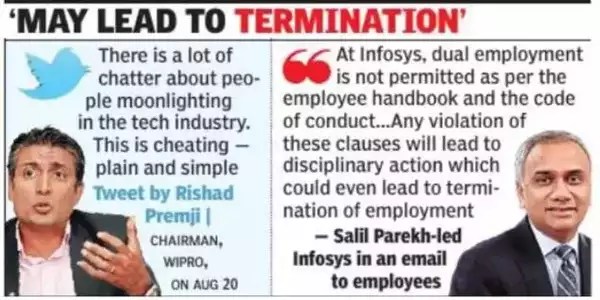Wipro Chairman, Rishad Premji, tweeted, “There is a lot of chatter about people moonlighting in the tech industry. This is cheating – plain and simple.” Infosys and Wipro have warned their employees against moonlighting. They condemn having a second job and find it unethical, and the employee will face serious consequences.

Infosys has warned its employees via email, warning them against Moonlighting. The email specified that moonlighting is a violation of an employee’s code of conduct and is not permittable. The email further stated that it would lead to disciplinary action and even termination of employment if found guilty. The email subject had categorically mentioned, “No two-timing” “no moonlighting,” and “No double lives.”
The email from Infosys further stated that dual employment of any kind would not be tolerated. At the time of employment, the terms and clauses in the employee handbook and the code of conduct were clearly specified, and the employees had agreed to it when they were extended the offer letter.
What is Moonlighting?
Moonlighting is getting extra side jobs in addition to regular employment. It initially became popular in the US when nearly 43% of the employees started taking part-time or contract jobs to obtain additional income. This was to overcome wage stagnation and low wages. The word “moonlighting” comes from having a secret job, especially at night.
The popularity of having side hustles or projects came to light during the COVID-19 pandemic. Many companies allow employees to work from home. It gave its employees the privacy they wanted to work simultaneously on projects for other companies. Now that the idea of working from home has been evoked by major companies, the topic of moonlighting has earned a mixed and divided opinion.
The issue of moonlighting has ignited fresh debates, raising divided opinions among tech professionals. The debate is centred on the ethical and legal implications of moonlighting.
In an interview with The Times of India, Krish Shankar, Infosys EVP and group HR Head, said that they had created a platform called Accelerate to encourage their employees to do internal gigs and keep the people on the bench engaged. If they are interested and have the time after their working hours, they can invest their time here to pursue their interest by doing internal gigs. He also mentioned that in the last two years they have been rewarding people for doing internal gigs.
While many IT firms are against moonlighting, there are few who support having a Side Gig. Swiggy, an Indian Foodtech start-up founded in July 2014, openly supported moonlighting and came forward with an official policy announcing that their employee can take up projects or side hustle providing their work on outside projects are after working hours and doesn’t hamper their performance in the company.
Venkatraman Narayan, MD and CFO of Happiest Minds believes that if the employment contract mentioned any clause against moonlighting, then it can be considered wrong. He further clarified that moonlighting should not be an issue unless the same has not been mentioned at the time of employment. “We at Indus Net Technologies have taken a futuristic (though controversial) view on moonlighting.” tweeted Abhishek Rungta, Founder and CEO, of Indus Net Technologies, sharing his views on moonlighting.













